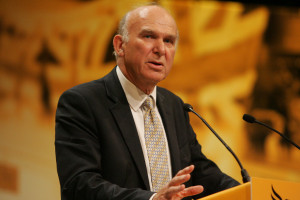Business minister Vince Cable has vowed to urge Home Secretary Theresa May to drop a plan to require some applicants for UK visas to pay ‘security bonds’ of up to £3,000 before being issued a visa.
Mr Cable told BBC Radio 4’s Today programme that the bonds would provoke “outrage” in countries whose citizens could be required to pay the bond.
The Home Secretary announced the scheme in June, saying that a pilot of the scheme would be launched in November. Few details of the scheme were revealed at the time or since, but a visa bond of “up to £3,000” was mooted and the six “high risk countries” that would be subject to the November pilot run were named. Reaction to being included in the pilot has been predictably hostile in India, Pakistan, Bangladesh, Sri Lanka, Nigeria and Ghana.
Since the announcement of the scheme, the response from various government quarters has served to muddy the waters, rather than provide clarity. Visa bonds will, it appears, be imposed on “some applicants” for visitor visas from “high risk countries”, though no detailed criteria have been set out. Neither did Mrs May stipulate whether holders of Tier 1 visas (for ‘high value migrants’), Tier 2 visas (for skilled workers) and Tier 4 visas (for students) would also have to pay.
Angry reaction
While the visa bond scheme was undoubtedly a hit with some right-wing elements of the British press, the reaction of Nigeria’s media was ferocious. The UK’s ambassador to Nigeria, Dr Andrew Pocock, was summoned to the office of Olugbenga Ashiru, the Nigerian foreign minister, to be told of the Nigerian government’s displeasure. Nigeria threatened that a planned bilateral trade deal between the two countries was under threat.
On 1st September, Dr Pocock told a Nigerian newspaper that the bond scheme was ‘not a policy’ of the UK government and said that there was therefore no existing plan to introduce the scheme (African Voice, Issue 498). He added that it would only be a pilot scheme and might not be permanent. He also offered an assurance that, even if it was made permanent, only ‘very small numbers’ of applicants would be involved.
News of the bond was also met with indignation in India. The Indian trade minister Anand Sharma has asked for ‘clarification’ from Mr Cable’s Department for Business, Innovation and Skills. Senior Indian business figures said that the bond would damage trade with the UK.
Mr Cable, who resides on the LibDem side of the Coalition, told the BBC that he intended to ask Mrs May to reconsider her approach to the bonds because they would damage Britain’s relations with other countries. He was speaking shortly after a Liberal Democrat colleague, Sarah Teather MP, had announced that she intended to stand down because of her ‘dismay’ at some of the policies that the Liberal Democrats had voted for in government. In particular, Ms Teather said that she had been depressed by the bond scheme, which had originally been proposed by the Deputy Prime Minister, Liberal Democrat leader Nick Clegg. Mr Cable said that he had ‘some sympathy’ with Ms Teather’s position but said that she had ‘overreacted’.
Mr Cable said that the original scheme proposed by Mr Clegg had been intended to allow some applicants who had applied for UK visas but had been refused, to come to the UK. The business minister said that Mr Clegg’s scheme would have allowed these failed applicants to apply again and to pay a bond. It was hoped that with the payment of the bond the UK’s immigration authorities would be more likely to grant the visa. But, Mr Cable said, the Conservatives, the senior partner in the Coalition and the party of which Mrs May is a member, had taken this benign policy and turned it into something more ‘negative’.
Mr Cable told the BBC:
“The way some of our colleagues in the coalition interpreted it was in a much more negative way; of saying that everyone who comes here should pay this very large bond and that is what Sarah reacted against.
“In government, certainly I and Nick and others will be arguing for a much more sensible and flexible approach to the bond, which is of course not policy and still only under discussion”.









